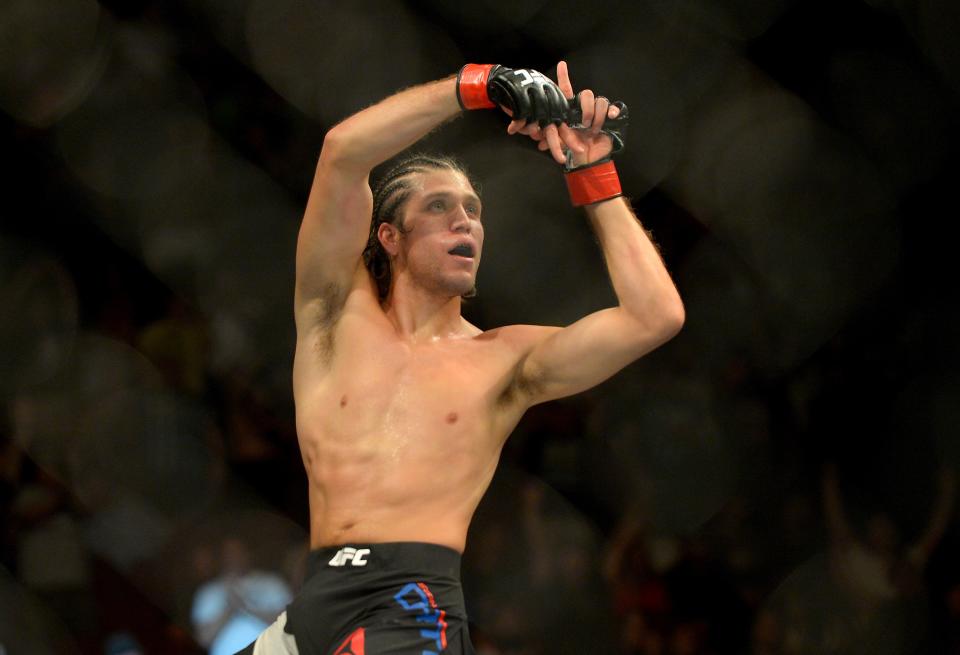How Brian Ortega's past motivated him to help children

He’d been in this situation countless times before. As a young boy, Brian Ortega fought about as often as he brushed his teeth. It was an almost daily occurrence.
Given that, he shouldn’t have been so afraid as he stood in the cage, awaiting his first mixed martial arts fight. He was 15 and extraordinarily talented. He had a great jiu-jitsu game, knew how to strike and had plenty of heart.
He’d lied about his age to take this fight, claiming he was 18 when the truth was that he was only 15 years old.
He was a boy, 124 pounds dripping wet, and suddenly, despite the people watching and the referee around to ensure things were fair, he was not so confident any more. He wanted no part of what was about to happen.
His opponent was 18 or 19 and weighed around 160 pounds, give or take a few.
“[It was] weird,” he said. “I’d been in countless street fights, but now I’m scared. It’s a controlled environment but for some reason, it felt a lot different.”
Ortega won, and he’s kept it up. Ortega, now 26, is 12-0 and faces Cub Swanson on Saturday in the main event of UFC Fight Night 123 in Fresno, California.
He’s a couple of wins away, at most, from challenging for the UFC’s featherweight title, currently held by rising star Max Holloway.
Ortega will be afraid on Saturday when he faces Swanson. He’ll be afraid if he ever fights Holloway, just like he is in every fight he takes.
“It’s just a different kind of feeling,” he said of fighting for a living.
He aspires to be the champion, but says his real goal is to make a difference in children’s lives. He’s already driven around the country, going to hospitals to visit sick children. He’s particularly interested in helping children with cystic fibrosis, but if there is a child in trouble, Ortega wants to help.
His charitable nature is something he got from his mother, he says, who used to visit sick children in the hospital when he was growing up.
He paid it no mind – “You know how it is, you’re a kid and you see your parents do something, you tend not to want to follow that and do your own thing,” he said, laughing – until he was sidelined early in his fight career by an injury.
He was 19 and had won a regional title. He couldn’t fight and couldn’t train and was making himself miserable.
“I was sitting around, moping and feeling badly for myself,” he said. “I went to the hospital to visit a child and it hit me, helping people is what I’m meant to do.”
He grew up in a harsh environment and saw things no young child should see. He’s seen friends lose their lives, drive-by shootings and all manner of trouble.
It struck a chord with him.
“I want to go out and help people and share love where love is needed,” he said. “If you want to make a difference, be the difference. I’ve been doing this since I was 19, visiting kids with cancer, cystic fibrosis, a lot of things. These kids have been through a lot and they have very hard lives.
“But they’re the real fighters. They carry burdens with them like you can’t imagine. The life expectancy of someone with cystic fibrosis is 35, and when you hear that, it starts to sink in. I started doing this when I was 19 and I often have asked myself, ‘How would you react if someone told you you would only live to be 35?’ I don’t know, man. I don’t know. I’d already have lived more than half my life. So I just want to go out there and tell them that there are people out there who care and hopefully catch the eye of someone, hopefully a billionaire with nothing but money. There are a lot of people suffering.”
He’s 12-0 and one of the bright rising stars in the sport. He’s already ranked sixth at featherweight and a win over Swanson should move him up.
There is a lot of work still to be done, and Ortega is a kind of guy who relishes it. He also knows he’s got to win back fans after he was suspended for nine months following his UFC debut when a post-fight urinalysis detected the presence of an anabolic steroid in his system.
“No one is a harsher critic of me than I am of myself, and I know I messed up badly,” he said. “I felt shame, and a lot of different emotions, honestly. The internet didn’t help things. People were badmouthing me, telling me to go kill myself and stuff like that. It was bad. There are people who do a lot of really crazy drugs and bad things and I’m looked like the bad guy because of this?”
After his suspension, he returned to knock out Thiago Tavares in the third round of a Fight of the Night battle.
That, Ortega said, was a crucial win for him.
“Tavares is 15 times better than [Mike De La Torre], the guy I fought when I got suspended,” Ortega said. “For me, coming back and fighting someone like Tavares and beating him the way I did, that was the ultimate way to say, ‘I’m back. This is me.’ I’m human and we all make mistakes. But just because you’re knocked down, you don’t have to stay down. Get up and fight. That’s what I tell these kids: ‘Don’t give up. Fight and you can beat this thing.’ ”
More from Yahoo Sports:
• High school girls basketball team wins 102-0
• Arrest made in cold-case killing of NBA star
• Beyonce makes surprise appearance, presents Kaepernick with SI award
• Transgender weightlifter medals after social media abuse

